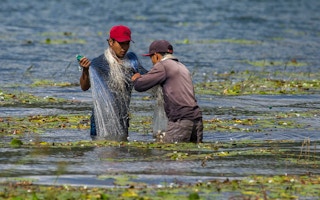When your home is surrounded by the ocean, you have a keen interest in protecting the waters and its ability to support life.
It is well documented that climate change poses an existential threat to island nations not only from rising sea levels but from ocean heat and acidity which threaten vital fisheries.
At the COP27 climate summit, island and archipelago nations have a chance to be heard by policymakers around the world in their bid to shore up fish stocks and protect a vital resource.
Many of these nations may be small but the fact is that their fish and seafood products provide nutrients for more than three billion people and supply an income for 10 to 12 per cent of the world’s population.
The Archipelagic and Island States Forum was initiated in 2017 by 47 island nations to help build climate change resilience, develop the “blue economy”, combat marine pollution, and build sustainable fisheries. In 2018, member nations adopted the Manado Joint Declaration which enshrined the goal of climate change resilience through sustainable fisheries as a key platform.
The term “too big to ignore” was given to small-scale fisheries whose role are significant in the development of sustainable fisheries but are often forgotten in the framework of policy making.
The challenge at COP27 is to ensure small fisheries have a place in coming up with solutions to ensure fishing sustainability for generations to come.
COP27 also provides an opportunity for improved connections between Africa and Pacific nations. A new Africa-Pacific Ocean bloc is emerging, united by debt and climate vulnerability. For Archipelagic and Island States Forum member countries, COP27 should be an opportunity to increase their bargaining power at international negotiations.
Indonesia plays an important role in this. As the world’s largest archipelago, with 17,500 islands, Indonesia’s waters support around 4,000 species of fish. It produces 7 million tonnes of seafood each year, with exports earning the country around US$5 billion.
Climate change puts all of this at risk.
Sea level rises of between 15 centimetres and 1.10 metres by 2100, more frequent oceanic heatwaves and changes in temperature and oxygen levels all threaten Indonesian fisheries. Future projections suggest waters in southern Indonesia are becoming less habitable for tuna due to reduced oxygen.
Climate change is also thought to be the cause of the decrease in the average abundance of marine life by five to 17 per cent.
That means catches shrink and people have to find alternative sources of food.
There are two scenarios facing fishing nations: with strong climate mitigation, the maximum catch potential could decrease by 2.8 to 5.3 per cent by 2050. In the absence of mitigation, that increases to seven to 12.1 per cent. All of these would affect the resilience of coastal communities who depend on fish resources as their livelihood backbone.
But in tropical nations, the maximum catch potential drops by 40 per cent.
Indonesia, therefore, has a significant role to play in influencing global policies related to the sustainability of marine-based economic development, including fisheries.
It was at the High-Level Panel for Sustainable Ocean Economy that President Joko Widodo and other members invited the world to secure our future food, by inviting marine countries to maintain fisheries as a pillar of protecting food from the sea from the impact of global climate change.
Members of the Archipelagic and Island States Forum and the Group of 20 (G20) could actively take several strategic actions such as: increasing innovation to reduce the carbon footprint of the fishery sector by providing a data system to transition from hunting to harvesting; developing a flow of research regarding the impacts of climate change on fisheries and building a framework for collaboration; implementing a fishery management plan by expanding collaborative data collection and monitoring; and building resilience to climate change by adopting progressive management from community-based fisheries through to global levels.
But cooperation is crucial. And that is where COP27 comes in. It is a chance for island nations to build stronger connections with developed nations through the G20.
Luky Adrianto is professor in fisheries resources management at IPB University, Bogor, Indonesia. He is a policy analyst in fisheries and ocean management and a lead expert on the Blue Economy Development Index hosted by UN Development Programme-AIS Secretariat.
Originally published under Creative Commons by 360info™.











